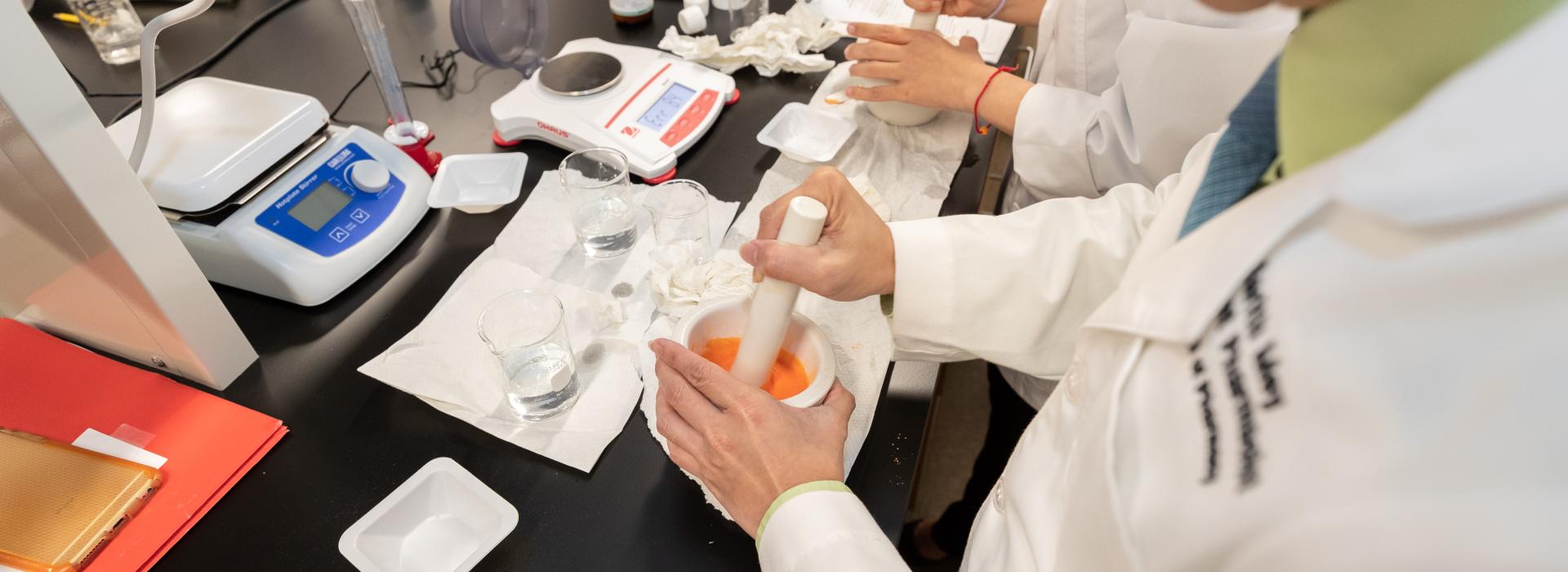Your Path to Academic Success
Your education at MBKU’s College of Pharmacy combines intensive classroom study with hands-on experiential learning, including both required and elective clinical rotations.
Didactic Years
The first three ‘didactic’ years and currently include a total of 150.75 units, which are subject to change as the program evolves. Courses during this time must be completed in the specified sequence before you can progress to subsequent quarters.
Clinical Courses
Currently, MBKU’s clinical courses include:
- Introductory Practice Experience courses taken during the first three years of the program (IPPE - 8 units).
- Advanced Practice Experience courses (APPE - 36 units) taken during the fourth and final year of the program.
For complete information, view the Course Catalog. Please note that all courses and seminars are required and must be completed before your PharmD degree is conferred.
Experiential Education
Similar to the academic training of other health care professionals, candidates for the Doctor of Pharmacy degree are expected to complete a significant amount of experiential training.
These experiential rotations provide students with an early opportunity to begin applying successively acquired pharmaceutical science and pharmacy practice knowledge in actual clinical and professional settings.
Summer Rotations
Second & Third Years
At the MBKU College of Pharmacy, students will complete an introductory community and hospital pharmacy practice rotations in the summer of the second and third years.
Final Year Practice Rotations
During the fourth and final year of the program, you will complete a total of six advanced pharmacy practice experiences, including these four, which are required, and two elective rotations of your choice:
- Hospital/Institutional Pharmacy Practice
- Community Pharmacy Practice
- Acute Care/Internal Medicine Pharmacy Practice
- Ambulatory Care Pharmacy Practice
Elective Rotations
You will also choose and complete two elective pharmacy-practice experience rotations, in such diverse practice areas as:
- Cardiology, Emergency Medicine, Geriatrics
- Healthcare Informatics, Home Health Care
- Infectious Disease/Antimicrobial Therapy
- Intensive Care Practice, Nephrology, Nuclear/Radiopharmacy
- Oncology, Optometric Specialty, Pediatrics
- Pharmaceutical Compounding, Pharmacy Management
- Population Health, Psychiatric Care
- Specialty Pharmacy Practice
For more information about rotations or the College of Pharmacy Curriculum, please download our latest Catalog of Courses.
Interprofessional, Team-Based Care
Whether you participate in introductory or advanced practice experience rotations, you will be expected to participate in the delivery of interprofessional team-based care, with the final goal of becoming a competent, compassionate and committed Doctor of Pharmacy.
Licensing Boards
All states license pharmacists. After completing a PharmD program, prospective pharmacists must pass two examinations to obtain a license--the North American Pharmacist Licensure Exam (NAPLEX), and the Multistate Pharmacy Jurisprudence Exam (MPJE), which is a required, state-specific test covering knowledge of pharmacy law.
About the NAPLEX
The NAPLEX assesses whether a prospective pharmacist can:
- Identify practice standards for safe and effective pharmacotherapy and optimize therapeutic outcomes in patients.
- Identify and determine safe and accurate methods to prepare and dispense medications.
- Provide and apply health care information to promote optimal health care.
Check the NAPLEX website for current cost information.
Degree Conferral
The degree Doctor of Pharmacy (PharmD) is conferred on students who are officially admitted to, and who satisfactorily complete, the 4-year professional curriculum.
Satisfactory completion of the MBKU program will academically qualify the graduate to sit for the NAPLEX. Doctor of Pharmacy degrees are conferred at the college's annual Commencement, which is held each May at the conclusion of the Spring Quarter.
Honors
Latinized honors are accorded at graduation to those students who have excelled scholastically on the following basis:
- Summa Cum Laude 3.80 – 4.00
- Magna Cum Laude 3.60 – 3.79
- Cum Laude 3.40 – 3.59
Transcript Requests
Requests for release of records for currently enrolled students must be made through the Office of Student Affairs.

